一般将来时态
一般将来时态

一般将来时一般将来时表示将来某一时刻的动作或状态,或将来某一段时间内经常的动作或状态。
常常和表示将来的时间状语连用。
如:tomorrow(明天),next week(下周),from now on (从现在开始);in the future(将来)等。
一般将来时由助动词shall(第一人称),will(第二、三人称)动词原形构成。
美国英语则不管什么人称,一律用will。
名称一般将来时/式(The Simple Future tense)定义be going to形式可以在任何情况下使用。
shall 和will 常常缩写成'll ,紧接在主语之后。
其否定式shall not 和will not 的缩写式分别为shan't 和won't。
基本句型肯定句:I/We shall/will go. You/He/She/They Will go. 否定句:I/We shall/will not go. You/He/She/They Will not go. 疑问句:Shall I/we go? Will you/he/she/they go? 简略回答:(肯)Yes,主语shall/will (否) No,主语shall/will not 特殊疑问句:一般将来时的特殊疑问句是将疑问词放在句首,后接一般疑问句(就主语提问时,以疑问词who开头的疑问词除外)----- why will you be here on Sunday?(周日你为什么将要在这儿?)-----I will have a meeting on Sunday (我将要在周日举行一个聚会)(对特殊疑问句要进行具体回答)一般疑问句:be或will提到句首,some改any,and改or,第一二人称互换We are going to go on an outing this weekend.-------Are you going to go on an outing this weekend? 被动句:will/shall+be+v.ed(及物动词过去分词)The letter will be sent tomorrow 这封信明天将寄出去We shall be punished if we break the rule 如果我们违反规定,我们将受到惩罚。
一般将来时态

一般将来时态:1、一般将来时表示将来某个时间要发生的动作或存在的状态,也表示将来经常或反复发生的动作,常与表示将来的时间状语连用。
如:tomorrow,soon,later,next week(month,year……),in a few days(months,years……),in the future等。
A.构成:肯定式为:助动词will/shall+动词原形,否定式为:助动词will/shall+not+动词原形表示未来的事实或对将来的预测。
在口语中,will在代词后常缩写为’ll,will not常缩写为B.构成:be going to+动词原形2、现在进行时表示将来。
表示位置移动的动词go,come,leave,fly,start等,可以用现在进行时表示将要发生的事。
如:I’m leaving tomorrow.我明天离开。
They are coming this evening.他们今晚会来。
3、一般现在时表示将来。
表示按计划要发生的事。
如:The train leaves/arrives at 10:35.火车10点35分开/到.当主句中的谓语动词用一般将来时,在时间或条件状语从句中用一般现在时表示将来。
如:When she comes,I’ll tell her about it.她来时我讲把这件事告诉她。
If you don’t find her,just leave her a note.如果你找不到她就给她留个便条。
5、There be句型表示将来时态用:There will be……/There is/are going to be……如:There will be more water in the sea.海里将有更多的水。
There is going to be a Chinese class this Friday.这个星期五将有一节语文课。
There are going to be three tickets for you.将有三张票给你们。
一般将来时态
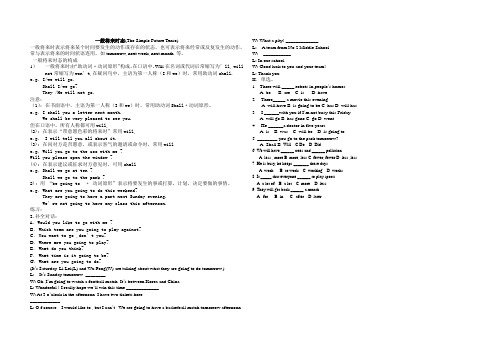
一般将来时态(The Simple Future Tense)一般将来时表示将来某个时间要发生的动作或存在的状态,也可表示将来经常或反复发生的动作,常与表示将来的时间状语连用,如tomorrow, next week, next month 等。
一般将来时态的构成1)一般将来时由“助动词﹢动词原形”构成。
在口语中,Will在名词或代词后常缩写为’ll, will not常缩写为won’t,在疑问句中,主语为第一人称(I和we)时,常用助动词shall.e.g. I/we will go.Shall I/we go?They /He will not go.注意:(1):在书面语中,主语为第一人称(I和we)时,常用助动词Shall﹢动词原形。
e.g.I shall you a letter next month.We shall be very pleased to see you.但在口语中,所有人称都可用will,(2): 在表示“带意愿色彩的将来时”常用will,e.g. I will tell you all about it.(3): 在问对方是否愿意,或表示客气的邀请或命令时,常用wille.g. Will you go to the zoo with me ?Will you please open the window ?(4): 在表示建议或征求对方意见时,可用shalle.g. Shall we go at ten ?Shall we go to the park ?2): 用“be going to ﹢动词原形”表示将要发生的事或打算,计划,决定要做的事情。
e.g.What are you going to do this weekend?They are going to have a part next Sunday evening.We’re not going to have any class this afternoon.练习:I.补全对话:A.Would you like to go with me ?B.W hich team are you going to play against?C.Y ou want to go ,don’t you?D.Where are you going to play?E.What do you think?F.What time is it going to be?G.What are you going to do?(It’s Saturday. Li Lei(L) and Wu Peng(W) are talking about what they are going to do tomorrow.)L: It’s Sunday tomorrow .________W: Oh ,I’m going to watch a football match. It’s between Korea and China.L: Wonderful ! I really hope we’ll win this time._____________W: At 3 o’clock in the afternoon. I have two tickets here.____________L: O f course I would like to , but I can’t . We are going to have a basketball match tomorrow afternoon. W: What a pity! _____________L: A team from No.2 Middle School.W: ___________L: In our school.W: Good luck to you and your team!L: Thank you.II.单选。
一般将来时时态用法讲解

⼀般将来时时态⽤法讲解⼀般将来时时态1. ⼀般将来时的定义⼀般将来时表⽰在现在看来即将要发⽣的动作或存在的状态。
常⽤时间副词tomorrow, soon或短语next year / week / month, in a few days, in the future, sometime 做状语。
如:What will you do this afternoon?你今天下午⼲什么?We will have a meeting tomorrow. 我们明天要开会。
He is going to study abroad(到国外) next year. 明年他要出国学习。
2. ⼀般将来时的结构及应⽤(1) shall / will + 动词原形。
表⽰即将发⽣的动作或存在的状态。
特别是表⽰客观性的事情或在某条件下要发⽣的事情,只能⽤此结构。
如:What shall we do if he doesn’t come 如果他不来,我们该怎么办?Will you be free this evening 今天晚上有空吗?I think he will tell us the truth(真相)。
我想他会告诉我们真实情况的。
(2) be going to + 动词原形。
表⽰已经计划或安排好了的事情,也可表⽰有迹象表明肯定要发⽣的事情。
如:We are going to have a meeting to discuss (讨论)the matter this evening. 今天晚上开会讨论这件事情。
Look at the black clouds over there. I think it is going to rain soon. 看⼀看那边的乌云,我想天要下⾬了。
There is going to be an English evening this week. 本周要举⾏⼀个英语晚会。
(3) be +现在分词。
一般将来时态
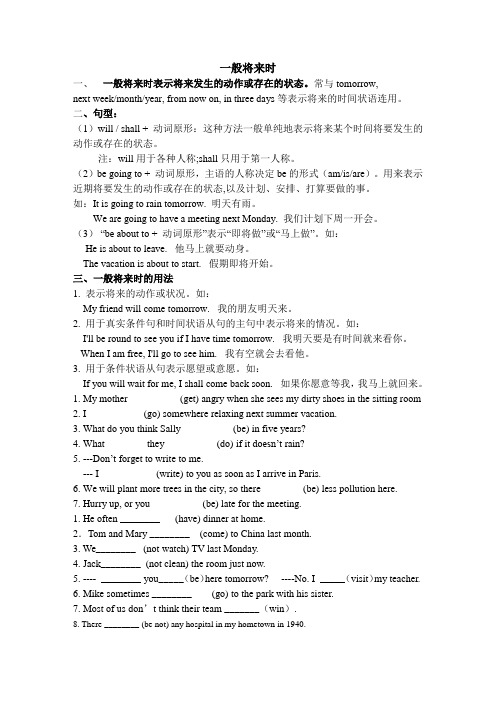
一般将来时一、一般将来时表示将来发生的动作或存在的状态。
常与tomorrow,next week/month/year, from now on, in three days等表示将来的时间状语连用。
二、句型:(1)will / shall + 动词原形:这种方法一般单纯地表示将来某个时间将要发生的动作或存在的状态。
注:will用于各种人称;shall只用于第一人称。
(2)be going to + 动词原形,主语的人称决定be的形式(am/is/are)。
用来表示近期将要发生的动作或存在的状态,以及计划、安排、打算要做的事。
如:It is going to rain tomorrow. 明天有雨。
We are going to have a meeting next Monday. 我们计划下周一开会。
(3)“be about to + 动词原形”表示“即将做”或“马上做”。
如:He is about to leave. 他马上就要动身。
The vacation is about to start. 假期即将开始。
三、一般将来时的用法1. 表示将来的动作或状况。
如:My friend will come tomorrow. 我的朋友明天来。
2. 用于真实条件句和时间状语从句的主句中表示将来的情况。
如:I'll be round to see you if I have time tomorrow. 我明天要是有时间就来看你。
When I am free, I'll go to see him. 我有空就会去看他。
3. 用于条件状语从句表示愿望或意愿。
如:If you will wait for me, I shall come back soon. 如果你愿意等我,我马上就回来。
1. My mother __________(get) angry when she sees my dirty shoes in the sitting room2. I ___________(go) somewhere relaxing next summer vacation.3. What do you think Sally __________(be) in five years?4. What ________they __________(do) if it doesn’t rain?5. ---Don’t forget to write to me.--- I ___________(write) to you as soon as I arrive in Paris.6. We will plant more trees in the city, so there ________(be) less pollution here.7. Hurry up, or you __________(be) late for the meeting.1. He often ________ (have) dinner at home.2.Tom and Mary ________ (come) to China last month.3. We________ (not watch) TV last Monday.4. Jack________ (not clean) the room just now.5. ---- ________ you_____(be)here tomorrow? ----No. I _____(visit)my teacher.6. Mike sometimes ________ (go) to the park with his sister.7. Most of us don’t think their team _______(win).8. There ________ (be not) any hospital in my hometown in 1940.。
英语语法—一般将来时态
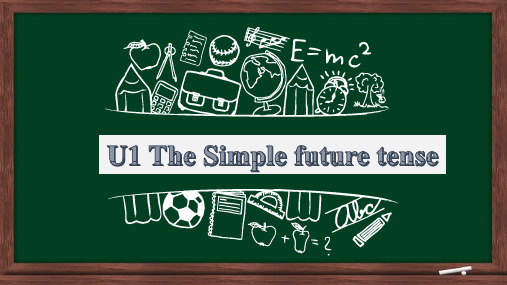
eg. My uncle is coming to see me tomorrow.
五、一般将来时特殊句式
1. There be 句式的一般将来时
Eg. There will be +其他 There is going to be+其他
2. 客观事实用一般现在
情态动词 (1)can/could:能够 could逾期 更委婉 (2)May/might 许可,准许 (3)Should 应该 主观义务
Have to 必须、不得不 (4)Must 主观必须,Must...?Yes,you must/no,you needn’t
Mustn’t 禁止 (5)Need 需要 Need...?Yes,you must/no,you needn’t
三、一般将来时 时间状语
Tomorrow、 Next week/month/year、 in+时间段、 this evening、 in the near future
四、一般将来时例句
1. 表示将来某个时间要发生的事 情或存在的状态。
eg.We will clean the room next week.
一、一般将来时用法(4)
1. 表示将来某个时间要发生的事 情或存在的状态。
3.条件、时间状语从句中,用一般 现在时表将来。
2. be going to 表示将要发生 或者打算、计划要做的事情,或者 可能发生的事情
4.go、come、leave、start等进行 时态表将来。
二、一般将来时结构 1. will / shall + 动词原形
Will / Shall +主语 + 动原 ?
时态一般将来时
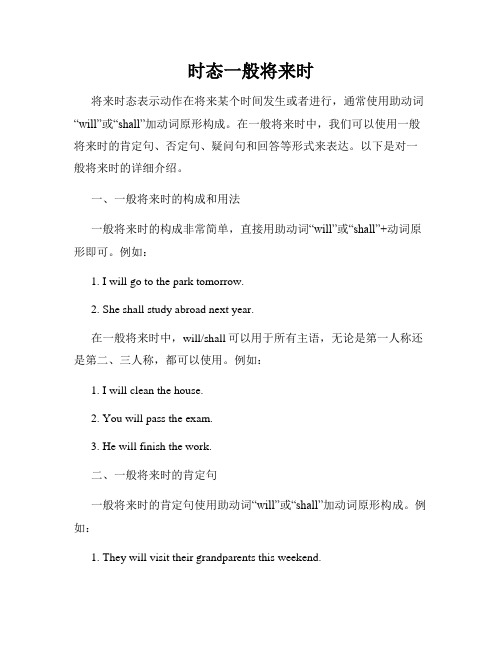
时态一般将来时将来时态表示动作在将来某个时间发生或者进行,通常使用助动词“will”或“shall”加动词原形构成。
在一般将来时中,我们可以使用一般将来时的肯定句、否定句、疑问句和回答等形式来表达。
以下是对一般将来时的详细介绍。
一、一般将来时的构成和用法一般将来时的构成非常简单,直接用助动词“will”或“shall”+动词原形即可。
例如:1. I will go to the park tomorrow.2. She shall study abroad next year.在一般将来时中,will/shall可以用于所有主语,无论是第一人称还是第二、三人称,都可以使用。
例如:1. I will clean the house.2. You will pass the exam.3. He will finish the work.二、一般将来时的肯定句一般将来时的肯定句使用助动词“will”或“shall”加动词原形构成。
例如:1. They will visit their grandparents this weekend.2. We shall have a party to celebrate.三、一般将来时的否定句一般将来时的否定句在助动词“will”或“shall”后面加上“not”,形成“will not”或“shall not”。
例如:1. She will not go to the concert.2. We shall not be late for the meeting.四、一般将来时的疑问句一般将来时的疑问句是将助动词“will”或“shall”提到主语之前。
例如:1. Will you join us for dinner?2. Shall we go to the cinema together?五、一般将来时的答案在一般将来时的疑问句中,肯定回答用"Yes, 主语 + will/shall"的形式,否定回答用"No, 主语 + will/shall not"的形式。
一般将来时态
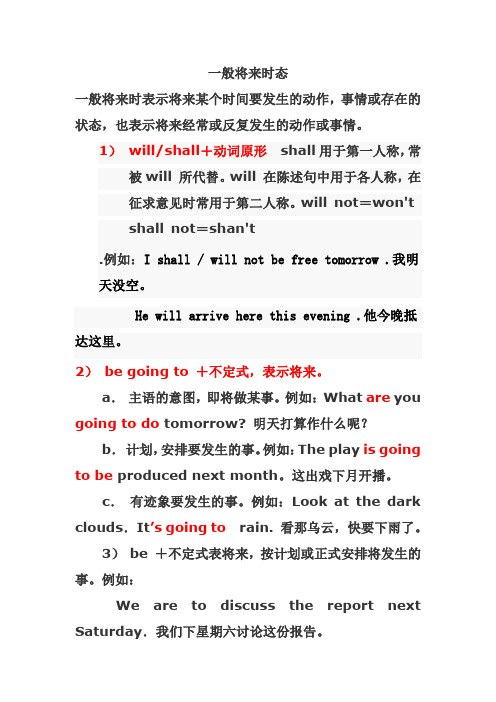
一般将来时态一般将来时表示将来某个时间要发生的动作,事情或存在的状态,也表示将来经常或反复发生的动作或事情。
1)will/shall+动词原形shall用于第一人称,常被will 所代替。
will 在陈述句中用于各人称,在征求意见时常用于第二人称。
will not=won'tshall not=shan't.例如:I shall / will not be free tomorrow .我明天没空。
He will arrive here this evening .他今晚抵达这里。
2)be going to +不定式,表示将来。
a.主语的意图,即将做某事。
例如:What are you going to do tomorrow? 明天打算作什么呢?b.计划,安排要发生的事。
例如:The play is going to be produced next month。
这出戏下月开播。
c.有迹象要发生的事。
例如:Look at the dark clouds.It’s going to rain. 看那乌云,快要下雨了。
3)be +不定式表将来,按计划或正式安排将发生的事。
例如:We are to discuss the report next Saturday.我们下星期六讨论这份报告。
4)be about to +不定式,意为马上做某事。
例如:He is about to leave for Beijing.他马上要去北京。
注意:be about to do 不能与tomorrow,next week 等表示明确将来时的时间状语连用。
Notice:be to和be going tobe to 表示客观安排或受人指示而做某事,be going to 表示主观的打算或计划。
例如:I am to play football tomorrow afternoon.明天下午我去踢球。
(客观安排)I'm going to play football tomorrow afternoon.明天下午我想去踢球。
一般将来时态精讲

一般将来时态精讲TPMK standardization office TPMK5AB- TPMK08- TPMK2C- TPMK18一般将来时态精讲(一)一般将来时(de)定义一般将来时表示将来某个时间所发生动(de)作或存在(de)状态,也可表示将来经常或反复发生(de)动作,经常与表示将来(de)时间状语连用, 如:soon, tomorrow,next week, in a few days等.例如:Where will you be this time tomorrow 明天这个时候你会在那儿1. 表示将要发生(de)动作或存在(de)状态.例如:I will return the book in a few days. 我过几天会还这本书.2. 表示将来经常或反复发生(de)动作.例如:They will go to the park every Sunday. 他们将每周日去公园.(二)一般将来时(de)构成一般将来时由“助动词shall/will+动词原形”构成.系动词am, is, are都用动词原形be.1. shall用于第一人称后表示一般将来时,一般只限于肯定句和否定句中.shall通常用于第一人称后,由其构成(de)一般疑问句用来询问对方(de)意见,这时(de)shall不含将来含义,也不可被will替代.例如:There’s no one to answer the phone. What shall we do 没有人接,我们该怎么办2.美国英语中,不论什么人称和数,一律用“will+动词原形”.在口语中,will常缩写为’ll,与主语连写在一起.如:I’ll, you’ll, he’ll, she’ll, we’ll, they’ll;而shall not常缩写为shan’t,will not常缩写为won’t.(三)一般将来时(de)结构1. 肯定句:主语+shall\will+动词原形.I shall\will work next year. 明年我将要工作了.2. 否定句:主语+shall\ will+not+动词原形.I won’t tell anyone what you said. 你说(de)话我不会告诉任何人.3. 一般疑问句:Shall\Will+主语+动词原形—Will you leave for Beijing next week 下周你将前往北京吗—Yes, I will. 是(de),我将要去. No, I won’t. 不,我不去.4. 特殊疑问句“特殊疑问词+一般疑问句”(de)语序,也就是“疑问词+will+主语+动词原形+其他成分”.如果是对主语提问,则主语就不在句子中出现.例如:Who will leave for Beijing next week 下周谁将前往北京(四)There be 句型(de)一般将来时There be 句型(de)一般将来时There will be表示“将来有……”.1. 肯定句:There will be+ 物+ 介词短语+其他.例如:There will be cars in people’s home in the future..将来人们(de)家里会很多(de)小汽车.2. 否定句:There won’t be + 物+介词短语+ 其他.例如:There won’t be any trees in this place in two years.两年后这个地方就不会有树了.3. 疑问句:Will there be +物+介词短语+其他例如:—Will there be less pollution 将来会有更少(de)污染吗—Yes, there will.是(de),会(de).—No, there won’t. 不,不会.(五)be going to 表示将来1.用来表示按计划或安排要发生(de)动作We are going to have a class meeting this afternoon.今天下午我们打算开班会.2.表示推测将要或肯定会发生(de)动作,有“准备;打算”(de)意思.含有be going to 结构(de)句子中往往有表示将来(de)时间状语.例如:Look at the black clouds. It's going to rain.看那些乌云,快要下雨了.结构:肯定句:主语 + be(am,is,are) + going to do sth.否定句:主语 + be(am,is,are)+ not + going to do sth.疑问句:Be(am,is,are)+ 主语 + going to do sthYes, 主语+ am/is/are. / No, 主语+ isn't/aren't. / No, I'm not. They are going to see the car factory next week. (肯定句) They are not going to see the car factory next week. (否定句)-Are they going to see the car factory next week-Yes, they are. (No, they aren't.) (一般疑问句及其回答)注意:There is / are going to be... (注意句型中going to 后面(de)be不能改为have.) 常用来表示将有某事发生.例如:There is going to be a football match next Saturday in our school.下周六我们学校将有一场足球比赛.(六)come, go, leave, arrive,take等表示位置移动(de)动词常用现在进行时表示将要发生(de)动作,它们很少与be going to 结构连用.例如:Miss Sun is coming tonight.今晚孙小姐要来.(七)be going to 和will(de)区别1.will表示说话人认为、相信、希望或假定要发生(de)事,不含任何具体(de)时间,可以指遥远(de)将来;而be going to 指有迹象表明某事即将发生或肯定发生,通常指很快就要发生(de)事情.2. be gong to 和will均可表示意图,但事先考虑过(de)意图用be going to,不是事先考虑过(de)意图用will.一般将来时练习一、单项选择( ) 1. There __________ a meeting tomorrow afternoon.A. will be going toB. will going to beC. is going to beD. will go to be( ) 2. Charlie ________ here next month.A. isn’t workingB. doesn’t workingC. isn’t going toworking D. won’t work( ) 3. He ________ very busy this week, he ________ free next week.A. will be; isB. is; isC. will be; will beD. is;will be( ) 4. There ________ a dolphin show in the zoo tomorrow evening.A. wasB. is going to haveC. will haveD.is going to be( ) 5. –________ you ________ free tomorrow – No. I ________ free the day aftertomorrow.A. Are; going to; willB. Are; going to be; willC. Are; going to; will beD. Are; going to be; will be( ) 6. Mother ________ me a nice present on my next birthday.A. will givesB. will giveC. givesD.give( ) 7. – Shall I buy a cup of tea for you –________. (不,不要.)A. No, you won’t.B. No, you aren’t.C. No, please don’t.D. No, please.( ) 8. – Where is the morning paper – I ________ it for youat once.A. getB. am gettingC. to getD. will get ( ) 9. ________ a concert next SaturdayA. There will beB. Will there beC. There can beD. There are( ) 10. If they come, we ________ a meeting.A. haveB. will haveC. hadD. would have( ) 11. He ________ her a beautiful hat on her next birthday.A. givesB. gaveC. will givingD. isgoing to give( ) 12. He ________ to us as soon as he gets there.A. writesB. has writtenC. will writeD. wrote( ) 13. He ________ in three days.A. coming backB. came backC. will come backD. isgoing to coming back( ) 14. If it ________ tomorrow, we’ll go roller-skating.A. isn’t rainB. won’t rainC. doesn’t rainD. doesn’t fine( ) 15. – Will his parents go to see the Terra Cotta Warriorstomorrow– No, ________ (不去).A. they willn’t.B. they won’t.C. they aren’t.D. they don’t.( ) 16. Who ________ we ________ swimming with tomorrow afternoonA. will; goB. do; goC. will; goingD. shall;go( ) 17. We ________ the work this way next time.A. doB. will doC. going to doD. will doing( ) 18. Tomorrow he ________ a kite in the open air first, and then________ boating in thepark.A. will fly; will goB. will fly; goesC. is going to fly;will goes D. flies; will go( ) 19. The day after tomorrow they ________ a volleyball match.A. will watchingB. watchesC. is watchingD. is going to watch( ) 20. There ________ a birthday party this Sunday.A. shall beB. will beC. shall going to beD. will going to be( ) 21. They ________ an English evening next Sunday.A. are havingB. are going to haveC. will havingD. is going to have( ) 22. ________ you ________ free next SundayA. Will; areB. Will; beC. Do; beD. Are; be( ) 23. He ________ there at ten tomorrow morning.A. willB. isC. will beD. be( ) 24. ________ your brother ________ a magazine from the libraryA. Are; going to borrowB. Is; going to borrowC. Will; borrowsD. Are; going to borrows( ) 25. – Shall I come again tomorrow afternoon –________ (好(de)).A. Yes, pleaseB. Yes, you will.C. No, please.D. No, you won’t.( ) 26. It ________ the year of the horse next year.A. is going to beB. is going toC. will beD. will is( ) 27. ________ open the windowA. Will you pleaseB. Please will youC. You pleaseD. Do you( ) 28. –Let’s go out to play football, shall we – OK. I________.A. will comingB. be going to comeC. comeD. am coming( ) 29. It ________ us a long time to learn English well.A. takesB. will takeC. spendsD. will spend ( ) 30. The train ____ at 11.A. going to arriveB. will be arriveC. is going toD. is arriving二、动词填空1. I ______(leave)in a minute. I ______(finish)all my work before I ______ (leave).2. —How long _____ you _____(study)in our country—I _____(plan)to be here for about one more year.—I _____(hope)to visit the other parts of your country.—What ______ you ______(do)after you ______(leave)here—I ______(return)home and ______(get)a job.3. I ______(be)tired. I ___________(go)to bed early tonight.4. Mary’s birthday is next Monday, her mother __________(give)her a present.5. It is very cold these days. It ___________(snow)soon.6. —_____ you _____(be)here this Saturday —No. I ___________(visit)my teacher.7. —______ I ______(get)you a copy of today’s newspaper —Thank you.8. I am afraid there ______(be)a meeting this afternoon. I can’t join you.9. Mike ___________( not , believe)this until he ______(see)it with his own eyes.10. Most of us don’t think their team ______(win).三、句型转换.1. People in the north often go skating in winter. (next winter)________________________________________________________________________ ______2.There are two cinemas in that town. (next year)________________________________________________________________________ ______3.He comes back late.(in two days)________________________________________________________________________ ______4.She is a conductor of a train.(soon)________________________________________________________________________ ______5.Li Ming is ten years old.(next year)________________________________________________________________________ ______6.I sometimes write to my mother in the evening.(tonight)________________________________________________________________________ ______7.He went there by plane.(some day next year)________________________________________________________________________ ______8.China is a modern and strong country.(in twenty years)________________________________________________________________________ ______9.Do you study hard(from now on)________________________________________________________________________ ______10.She didn’t speak English at the meeting.(before long)________________________________________________________________________ ______。
“一般将来时”的几种语法形式[整理版]
![“一般将来时”的几种语法形式[整理版]](https://img.taocdn.com/s3/m/6c03bef44bfe04a1b0717fd5360cba1aa8118c39.png)
“一般将来时”的几种语法形式一般将来时的语法形式主要有四种:shall / will +动词原形;be going to +动词原形;现在进行时和一般现在时。
现将这四种形式分述如下:一、shall / will +动词原形1. will可用于所有人称,但shall 仅表示单纯将来时,用于第一人称I和we,作为will的一种替代形式。
以Y ou and I为主语时通常避免用shall。
例如:He will be back soon. 他很快就会回来。
I shall/will be free on Sunday. 星期天我有空。
Y ou and I will work in the same factory. 你和我将在同一工厂工作。
2. will, shall可用来预言将来发生的事。
如说出我们设想会发生的事,或者请对方预言将要发生什么事。
例如:It will rain tomorrow. 明天将要下雨。
3. will, shall除可表示单纯的将来时以外,还可以带有意愿的色彩,仍指的是将来。
例如:I’ll buy you a bicycle for your birthday. 你过生日时,我给你买一辆自行车。
(表示允诺) Will you open the door for me please? 请你帮我开门好吗?(表示请求)Shall I get your coat for you? 我可以为你拿外套吗?(表示提议)二、be going to +动词原形1. 表示说话人根据现在已有的迹象,判断将要或即将发生某种情况。
这类句子的主语可以是人,也可是物。
例如:There is going to be a football match in our school tomorrow afternoon. 明天下午我们学校将有一场足球赛。
(已有告示)I feel terrible. I think I’m going to die. 我感到难受极了,我想我快不行了。
一般将来时态

三、标志语
tomorrow next week (month, year…) this afternoon, this evening
一.填空1.My brother ______(go) to Shanghai next week. 2.Mary ________(not see) her son tomorrow. 3. _____David_______(fly) kites in the park next Sunday?
• (some改为any )
(1)我今晚不去那儿。
I
go there this evening.
(2)你今天下午不购物。
You
go shopping this afternoon.
(3)They are going to buy some apples next Monday.(变否定句)
(三)一般疑问句:
4.I___________(make) a plan for English studythis evening.
5.Who ______(be) going to learn a new song next Tuesday?
6.____(be) you going to Beijing tomorrow? 7.We ______(not be) going to play games this afternoon. 8. Where ___you ____(leave) for tomorrow? 9.___Tom _______ (have) a P.E. lesson next Monday? 10. What ___they____(watch) tomorrow?
• be 或will 放主语前(some改为any )
英语时态:一般将来时

英语时态:一般将来时一般将来时(simple future tense)表示将来某一时段的动作或状态,或将来某一段时间内经常的动作或状态。
一般将来时常常和表示将来的时间状语连用。
如:tomorrow, next week, in the future, in a year等。
Ⅰ. 句法结构【仅讨论陈述句和疑问句两种语式】:1.陈述句:A. 肯定形式:主语+be going to /will/shall +动词原形+其他B. 否定形式:主语+be not going to /will not/shall not+动词原形+其他注:a. 在直接在助动词后加not。
b. be going to结构中的be仅指am, is, are三个be动词。
c. will/shall+动原结构在谓语两态变化中无人称和数的变化。
d. 一般情况下,仅表示时态时,shall用于第一人称,will用于第二、三人称;表示说话人强烈意愿和语气时则用法相反。
2.疑问句:A. 一般疑问句:助动词提前即可①Be动词+主语+ going to +动词原形+其他②Will/Shall+主语+动词原形+其他B.特殊疑问句:特殊疑问词+一般疑问句(同上)3.被动语态:主语+ 助动词(结构) + be +动词过去分词【被动结构be done,时体现在助动词】➢两态变化例句参考下表(以will为例):Ⅰ. 主要用法及结构:1.【一般将来时表将来】一般将来时表示将要发生的动作或情况。
A.will/shall +动原I will(shall) arrive tomorrow.Will you be free tonight?B.be going to+动原a.表示计划、打算、准备做的事。
We are going to put up a building here.b.表示即将发生或肯定要发生的事。
I think it is going to snow.注:在一般将来时的句子中,有时有表示将来时间的状语,有时没有时间状语,这时要从意思上判断是否指未来的动作或情况。
一般将来时态讲解
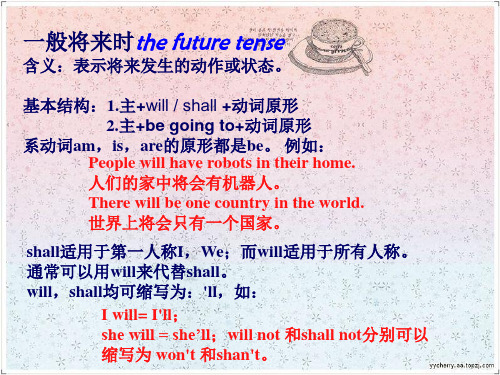
1. Do you want a job at Village Paints?
Please talk to ____u__s____ on Monday.
Marie and me
2. Give __h_im___ an umbrella. It’s raining.
Mr. Loyola
3. This coffee is cold. Please bring __h_e_r___some hot coffee.
Beijing at eleven.
4.一般将来时的常用结构
• ①用于“I expect, I‘m sure, I think, I wonder + 宾语从句”中
• Don't worry about the exam. I'm sure you'll pass.
• 不要担心这次考试,我确信你会通过的。
6.He will be
(be) back in three hours.
7.We will send (send) for a doctor if
you
are
(be) not better in the evening.
• 3.其他一般将来时态结构
• 1.现在进行时表将来(be + doing) • 表示某个按最近的计划或安排即将要进行的动作,an arrangement
• That bag looks heavy. I'll help you with it. • I won't tell anyone what happened, I
promise. • ④表示一种倾向或推测 • Flowers will die without water. • Water will change into ice at 0℃. • This will be your sister, I guess.
一般将来时总结
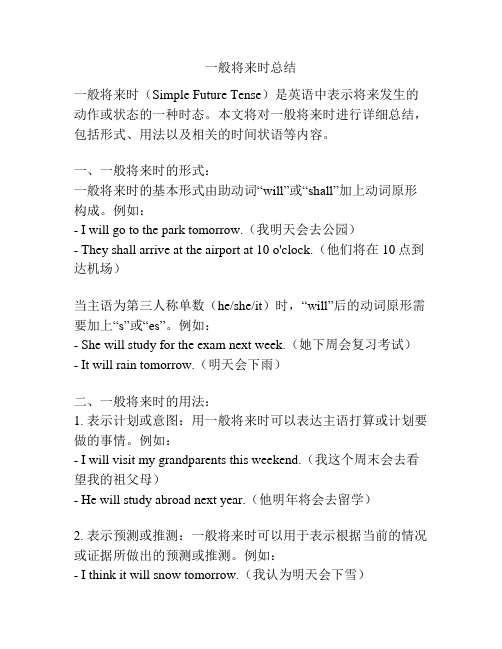
一般将来时总结一般将来时(Simple Future Tense)是英语中表示将来发生的动作或状态的一种时态。
本文将对一般将来时进行详细总结,包括形式、用法以及相关的时间状语等内容。
一、一般将来时的形式:一般将来时的基本形式由助动词“will”或“shall”加上动词原形构成。
例如:- I will go to the park tomorrow.(我明天会去公园)- They shall arrive at the airport at 10 o'clock.(他们将在10点到达机场)当主语为第三人称单数(he/she/it)时,“will”后的动词原形需要加上“s”或“es”。
例如:- She will study for the exam next week.(她下周会复习考试)- It will rain tomorrow.(明天会下雨)二、一般将来时的用法:1. 表示计划或意图:用一般将来时可以表达主语打算或计划要做的事情。
例如:- I will visit my grandparents this weekend.(我这个周末会去看望我的祖父母)- He will study abroad next year.(他明年将会去留学)2. 表示预测或推测:一般将来时可以用于表示根据当前的情况或证据所做出的预测或推测。
例如:- I think it will snow tomorrow.(我认为明天会下雪)- They believe she will win the competition.(他们相信她会赢得比赛)3. 表示意愿或允诺:一般将来时可以表达主语的意愿或承诺要做某事。
例如:- I will help you with your homework.(我会帮你做作业)- He will stop smoking.(他将戒烟)4. 表示预定的事件或安排的计划:一般将来时可以用于表示已经安排好的事件或计划。
一般将来时的表达形式
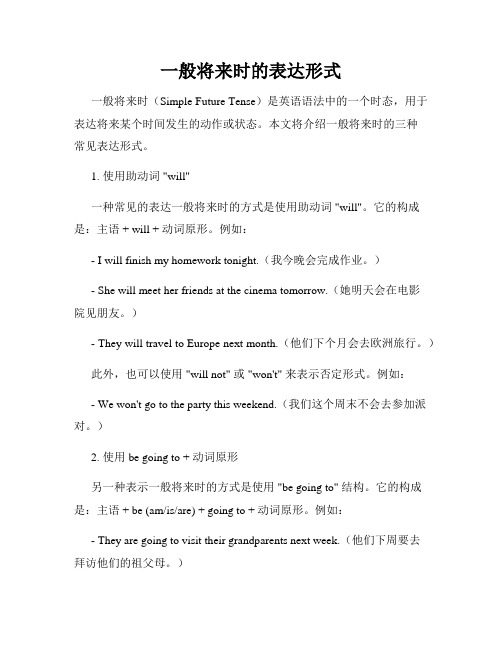
一般将来时的表达形式一般将来时(Simple Future Tense)是英语语法中的一个时态,用于表达将来某个时间发生的动作或状态。
本文将介绍一般将来时的三种常见表达形式。
1. 使用助动词 "will"一种常见的表达一般将来时的方式是使用助动词 "will"。
它的构成是:主语 + will + 动词原形。
例如:- I will finish my homework tonight.(我今晚会完成作业。
)- She will meet her friends at the cinema tomorrow.(她明天会在电影院见朋友。
)- They will travel to Europe next month.(他们下个月会去欧洲旅行。
)此外,也可以使用 "will not" 或 "won't" 来表示否定形式。
例如:- We won't go to the party this weekend.(我们这个周末不会去参加派对。
)2. 使用 be going to + 动词原形另一种表示一般将来时的方式是使用 "be going to" 结构。
它的构成是:主语 + be (am/is/are) + going to + 动词原形。
例如:- They are going to visit their grandparents next week.(他们下周要去拜访他们的祖父母。
)- I am going to learn how to play the piano.(我打算学习弹钢琴。
)- She isn't going to eat fast food anymore.(她不再打算吃快餐了。
)该结构也可以用于否定形式,只需在 "be" 后加 "not"。
一般将来时定义,结构,标志词,用法,变化规则
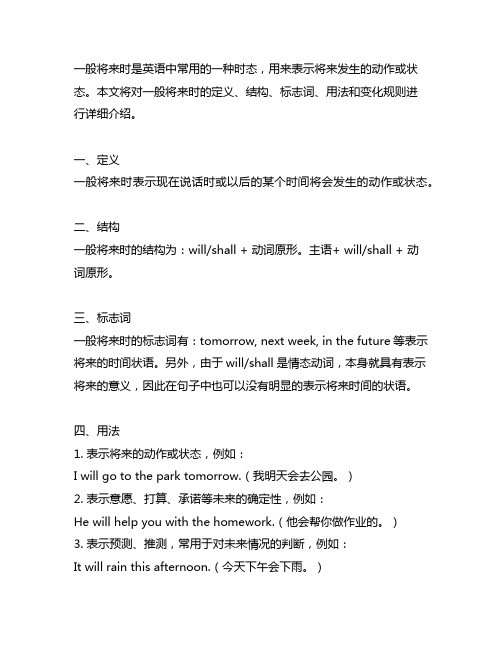
一般将来时是英语中常用的一种时态,用来表示将来发生的动作或状态。
本文将对一般将来时的定义、结构、标志词、用法和变化规则进行详细介绍。
一、定义一般将来时表示现在说话时或以后的某个时间将会发生的动作或状态。
二、结构一般将来时的结构为:will/shall + 动词原形。
主语+ will/shall + 动词原形。
三、标志词一般将来时的标志词有:tomorrow, next week, in the future等表示将来的时间状语。
另外,由于will/shall是情态动词,本身就具有表示将来的意义,因此在句子中也可以没有明显的表示将来时间的状语。
四、用法1. 表示将来的动作或状态,例如:I will go to the park tomorrow.(我明天会去公园。
)2. 表示意愿、打算、承诺等未来的确定性,例如:He will help you with the homework.(他会帮你做作业的。
)3. 表示预测、推测,常用于对未来情况的判断,例如:It will rain this afternoon.(今天下午会下雨。
)五、变化规则1. 肯定句的一般将来时结构为:will/shall + 动词原形。
例如:She wille to see me tomorrow.(她明天会来看我。
)2. 否定句的一般将来时结构为:will/shall + not + 动词原形。
例如:I will not go to the party tonight.(我今晚不会去参加派对。
)3. 疑问句的一般将来时结构为:will/shall + 主语+ 动词原形。
例如:Will youe to the meeting tomorrow?(你明天会来参加会议吗?)以上就是关于一般将来时的定义、结构、标志词、用法和变化规则的详细介绍。
希望对您有所帮助。
一般将来时是英语中最常用的一种时态之一,用于表示将来会发生的动作或状态。
将来时态的种种用法及几种时态区别

将来时态的种种用法及几种时态区别一、一般将来时态:四种形式表达将来时: will / shall+动词原形, be going to+动词原形, be doing,以及一般现在时.shall / will / be going to +动词原形be to do sth.be +coming (leaving, starting, reaching, returning….)be about to do sth.1. will / shall表示单纯的将来(即现在的之后),will还可以表示"决心"、"意愿";shall 用于第一、三人称的问句中,还可以表示征求对方的意见.例如:He will be back in a few days.(单纯将来)I will study hard to keep up with my classmates.(决心或意愿)Shall I go with you?(征求意见)【注意】在含有if的条件状语从句时,主句中要用will表示将来时.例如:If it doesn't rain tomorrow, we will go climbing.2. be going to+动词原形多用于口语,强调事先的"打算、计划"要做的事情或有某种迹象要发生的事情.例如:What are you going to do this evening?(打算)Look!There are so many clouds in the sky. It's going to rain, I think. (有迹象要发生的事情)3. be doing代表现在进行时.现在进行时表示即将发生的将来,多与表示位移的动词come, go, arrive, leave, fly, start等连用.例如:She is leaving for Beijing. 她就要启程去北京.4. 一般现在时表示将来时,主要用于时间状语从句或条件状语从句中;或者用来表示按时刻表的规定将要发生的动作.例如:I'll tell him about it as soon as I see him.My plane takes off at seven tomorrow morning.5.用“be+动词不定式”或用“be about to +动词原形”的结构表示如:He is to visit Japan next year.明年他将访问日本。
一般将来时态

PART 05
练习与巩固
REPORTING
基础练习题
用will表示基本的将 来时态
用be to表示计划好 的将来时态
总结词:熟悉一般 将来时态的基本用 法
用be going to表示 基于主观判断的将 来时态
用be about to表示 即将发生的将来时 态
进阶练习题
01
总结词:辨析一般将来时态与其 他时态的差异
PART 04
一般将来时态的特殊用法
REPORTING
表示将来经常发生的事情
经常性动作
使用助动词“will”或“shall”来表示一个 动作在将来经常发生,例如:“I will go to the market every Saturday.”
习惯性动作
使用助动词“will”或“shall”来表示一个 习惯性动作在将来重复发生,例如: “They shall arrive every Friday at 5 p.m.”
02
一般现在时态与一般将来时态的 对比
现在进行时态与一般将来时态的 对比
03
现在完成时态与一般将来时态的 对比
04
综合练习题
01
总结词:综合运用态 、现在完成时态与一般将来时 态的转换
疑问句的构成规则
规则一
Will + 主语 + 动词原形 + 其他?例如: Will she come to the party?(她会来 参加聚会吗?)
VS
规则二
主语 + Will + 动词原形 + 其他?例如: Will you help me with this task?(你 会帮我完成这项任务吗?)
表示将来的计划和安排
